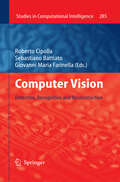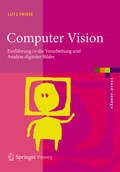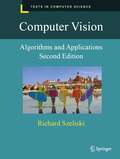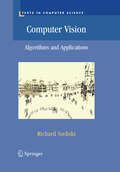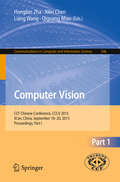- Table View
- List View
Computer Networks and Information Technologies: Second International Conference on Advances in Communication, Network, and Computing, CNC 2011, Bangalore, India, March 10-11, 2011. Proceedings (Communications in Computer and Information Science #142)
by Vinu V. Das Janahanlal Stephen Yogesh ChabaThis book constitutes the refereed proceedings of the Second International Conference on Advances in Communication, Network, and Computing, CNC 2011, held in Bangalore, India, in March 2011. The 41 revised full papers, presented together with 50 short papers and 39 poster papers, were carefully reviewed and selected for inclusion in the book. The papers feature current research in the field of Information Technology, Networks, Computational Engineering, Computer and Telecommunication Technology, ranging from theoretical and methodological issues to advanced applications.
Computer Processing of Electron Microscope Images (Topics in Current Physics #13)
by J. Frank P. W. Hawkes R. Hegerl W. Hoppe M. S. Isaacson D. Kopf J. E. Mellema W. O. Saxton M. Utlaut R. H. WadeTowards the end of the 1960s, a number of quite different circumstances combined to launch a period of intense activity in the digital processing of electron micro graphs. First, many years of work on correcting the resolution-limiting aberrations of electron microscope objectives had shown that these optical impediments to very high resolution could indeed be overcome, but only at the cost of immense exper imental difficulty; thanks largely to the theoretical work of K. -J. Hanszen and his colleagues and to the experimental work of F. Thon, the notions of transfer func tions were beginning to supplant or complement the concepts of geometrical optics in electron optical thinking; and finally, large fast computers, capable of manipu lating big image matrices in a reasonable time, were widely accessible. Thus the idea that recorded electron microscope images could be improved in some way or rendered more informative by subsequent computer processing gradually gained ground. At first, most effort was concentrated on three-dimensional reconstruction, particu larly of specimens with natural symmetry that could be exploited, and on linear operations on weakly scattering specimens (Chap. l). In 1973, however, R. W. Gerchberg and W. O. Saxton described an iterative algorithm that in principle yielded the phase and amplitude of the electron wave emerging from a strongly scattering speci men.
Computer Safety, Reliability and Security: 21st International Conference, SAFECOMP 2002, Catania, Italy, September 10-13, 2002. Proceedings (Lecture Notes in Computer Science #2434)
by Stuart Anderson Sandro Bologna Massimo FeliciThis book constitutes the refereed proceedings of the 21st International Conference on Computer Safety, Reliability and Security, SAFECOMP 2002, held in Catania, Italy in September 2002.The 27 revised papers presented together with 3 keynote presentations were carefully reviewed and selected from 69 submissions. The papers are organized in topical sections on human-computer system dependability, human factors, security, dependability assessment, application of formal methods, reliability assessment, design for dependability, and safety assessment.
Computer Safety, Reliability, and Security: 38th International Conference, SAFECOMP 2019, Turku, Finland, September 11–13, 2019, Proceedings (Lecture Notes in Computer Science #11698)
by Alexander Romanovsky Elena Troubitsyna Friedemann BitschThis book constitutes the proceedings of the 38th International Conference on Computer Safety, Reliability and Security, SAFECOMP 2019, held in Turku, Finland, in September 2019. The 16 full and 5 short papers included in this volume were carefully reviewed and selected from 65 submissions. They were organized in topical sections named: formal verification; autonomous driving; safety and reliability modeling; security engineering and risk assessment; safety argumentation; verification and validation of autonomous systems; and interactive systems and design validation.
Computer Safety, Reliability, and Security: SAFECOMP 2019 Workshops, ASSURE, DECSoS, SASSUR, STRIVE, and WAISE, Turku, Finland, September 10, 2019, Proceedings (Lecture Notes in Computer Science #11699)
by Alexander Romanovsky Elena Troubitsyna Ilir Gashi Erwin Schoitsch Friedemann BitschThis book constitutes the proceedings of the Workshops held in conjunction with SAFECOMP 2019, 38th International Conference on Computer Safety, Reliability and Security, in September 2019 in Turku, Finland. The 32 regular papers included in this volume were carefully reviewed and selected from 43 submissions; the book also contains two invited papers. The workshops included in this volume are: ASSURE 2019: 7th International Workshop on Assurance Cases for Software-Intensive Systems DECSoS 2019: 14th ERCIM/EWICS/ARTEMIS Workshop on Dependable Smart Embedded and Cyber-Physical Systems and Systems-of-Systems SASSUR 2019: 8th International Workshop on Next Generation of System Assurance Approaches for Safety-Critical Systems STRIVE 2019: Second International Workshop on Safety, securiTy, and pRivacy In automotiVe systEms WAISE 2019: Second International Workshop on Artificial Intelligence Safety Engineering
Computer Science – CACIC 2018: 24th Argentine Congress, Tandil, Argentina, October 8–12, 2018, Revised Selected Papers (Communications in Computer and Information Science #995)
by Patricia Pesado Claudio AcitiThis book constitutes revised selected papers from the 24th Argentine Congress on Computer Science, CACIC 2018, held in Tandil, Argentina, in October 2018. The 26 papers presented in this volume were carefully reviewed and selected from a total of 155 submissions. They were organized in topical sections named: Agents and Systems; Distributed and Parallel Processing; Technology Applied to Education; Graphic Computation, Images and Visualization; Software Engineering; Databases and Data Mining; Hardware Architectures, Networks, and Operating Systems; Innovation in Software Systems; Signal Processing and Real-Time Systems; Computer Security; Innovation in Computer Science Education; and Digital Governance and Smart Cities.
Computer Science Art: Mathematik als generatives Gestaltungsprinzip. Digital erzeugte Bilder (pdf)
by Herbert W. Franke Horst HelbigComputer Science Protecting Human Society Against Epidemics: First IFIP TC 5 International Conference, ANTICOVID 2021, Virtual Event, June 28–29, 2021, Revised Selected Papers (IFIP Advances in Information and Communication Technology #616)
by Erol Gelenbe Yuko Murayama Tadeusz Czachórski Krzysztof Grochla Aleksander ByrskiThis book constitutes the refereed post-conference proceedings of the First IFIP TC 5 International Conference on Computer Science Protecting Human Society Against Epidemics, ANTICOVID 2021, held virtually in June 2021.The 7 full and 4 short papers presented were carefully reviewed and selected from 20 submissions. The papers are concerned with a very large spectrum of problems, ranging from linguistics for automatic translation of medical terms, to a proposition for a worldwide system of fast reaction to emerging pandemic.
Computer Supported Education: 15th International Conference, CSEDU 2023, Prague, Czech Republic, April 21–23, 2023, Revised Selected Papers (Communications in Computer and Information Science #2052)
by Bruce M. McLaren James Uhomoibhi Jelena Jovanovic Irene-Angelica ChountaThis book constitutes revised selected papers from the 15th International Conference on Computer Supported Education, CSEDU 2023, which took place in Prague, Czech Republic, during April 21–23, 2023.CSEDU 2023 accepted 34 full and 54 papers out of 162 papers submissions. Out of these, 8 contributions have been selected for inclusion in this book. The papers included in this book contribute to the understanding of relevant trends in the current research on Computer Supported Education, with a particular focus on: eLearning Platforms, Portals, Feedback and Learning Support, Game-Based and Simulation-Based Learning, Active Learning, Tools to Assess Learning, Learning with AI Systems, Higher Order Thinking Skills, Flipped Classroom, Faculty Development and Constructivism and Social Constructivism.
Computer Supported Education: 14th International Conference, CSEDU 2022, Virtual Event, April 22–24, 2022, Revised Selected Papers (Communications in Computer and Information Science #1817)
by James UhomoibhiThis book constitutes the refereed post-proceedings of the 14th International Conference on Computer Supported Education, CSEDU 2022, Virtual Event, April 22–24, 2022. The conference was held virtually due to the COVID-19 crisis.The 8 full papers included in this book were carefully reviewed and selected from 181 submissions. The papers included in CSEDU 2022 proceedings contribute to the understanding of relevant trends of current research on Computer Supported Education, including: Emerging Technologies in Education for Sustainable Development, Instructional Design, Pre-K/K-12 Education, Machine Learning, Learning with AI Systems, Higher Order Thinking Skills, Game-Based and Simulation-Based Learning, Educational Data Mining, Course Design and eLearning Curriculae and Constructivism and Social Constructivism.
Computer Supported Education: 13th International Conference, CSEDU 2021, Virtual Event, April 23–25, 2021, Revised Selected Papers (Communications in Computer and Information Science #1624)
by James Uhomoibhi Beno CsapóThis book constitutes selected, revised and extended papers from the 13th International Conference on Computer Supported Education, CSEDU 2021, held as a virtual event in April 2021.The 27 revised full papers were carefully reviewed and selected from 143 submissions. They were organized in topical sections as follows: artificial intelligence in education; information technologies supporting learning; learning/teaching methodologies and assessment; social context and learning environments; ubiquitous learning; current topics.
Computer Vision: Detection, Recognition and Reconstruction (Studies in Computational Intelligence #285)
by Roberto Cipolla Sebastiano Battiato Giovanni Maria FarinellaComputer vision is the science and technology of making machines that see. It is concerned with the theory, design and implementation of algorithms that can automatically process visual data to recognize objects, track and recover their shape and spatial layout. The International Computer Vision Summer School - ICVSS was established in 2007 to provide both an objective and clear overview and an in-depth analysis of the state-of-the-art research in Computer Vision. The courses are delivered by world renowned experts in the field, from both academia and industry, and cover both theoretical and practical aspects of real Computer Vision problems. The school is organized every year by University of Cambridge (Computer Vision and Robotics Group) and University of Catania (Image Processing Lab). Different topics are covered each year. A summary of the past Computer Vision Summer Schools can be found at: http://www.dmi.unict.it/icvss This edited volume contains a selection of articles covering some of the talks and tutorials held during the first two editions of the school on topics such as Recognition, Registration and Reconstruction. The chapters provide an in-depth overview of these challenging areas with key references to the existing literature.
Computer Vision: Einführung in die Verarbeitung und Analyse digitaler Bilder (eXamen.press)
by Lutz PrieseDer Autor erläutert in dieser Einführung auf Bachelorniveau die in der Computer Vision verwendeten technischen Ausdrücke: Grundlagen des menschlichen Sehens, Farbe, exakte Begriffsbestimmungen zum Thema "Bild", Transformationen, lineare und nicht-lineare Filter, Fouriertransformation, Morphologie, Merkmale im Bild wie Kanten, Ecken, geometrische Formen mittels Hough-Transformation, diverse Hüllen und Skelettierung. Ferner höhere Merkmale wie SIFT, Shape-Context und statistische Merkmale, Texturmerkmale. Die Bestimmung von Segmenten (zusammenhängende Regionen ähnlicher Farben oder Grauwerte) wird in einem eigenen Kapitel ausführlich behandelt.
Computer Vision: Algorithms and Applications (Texts in Computer Science)
by Richard SzeliskiComputer Vision: Algorithms and Applications explores the variety of techniques used to analyze and interpret images. It also describes challenging real-world applications where vision is being successfully used, both in specialized applications such as image search and autonomous navigation, as well as for fun, consumer-level tasks that students can apply to their own personal photos and videos.More than just a source of “recipes,” this exceptionally authoritative and comprehensive textbook/reference takes a scientific approach to the formulation of computer vision problems. These problems are then analyzed using the latest classical and deep learning models and solved using rigorous engineering principles.Topics and features:Structured to support active curricula and project-oriented courses, with tips in the Introduction for using the book in a variety of customized coursesIncorporates totally new material on deep learning and applications such as mobile computational photography, autonomous navigation, and augmented realityPresents exercises at the end of each chapter with a heavy emphasis on testing algorithms and containing numerous suggestions for small mid-term projectsIncludes 1,500 new citations and 200 new figures that cover the tremendous developments from the last decadeProvides additional material and more detailed mathematical topics in the Appendices, which cover linear algebra, numerical techniques, estimation theory, datasets, and softwareSuitable for an upper-level undergraduate or graduate-level course in computer science or engineering, this textbook focuses on basic techniques that work under real-world conditions and encourages students to push their creative boundaries. Its design and exposition also make it eminently suitable as a unique reference to the fundamental techniques and current research literature in computer vision.
Computer Vision: Algorithms and Applications (Texts in Computer Science)
by Richard SzeliskiComputer Vision: Algorithms and Applications explores the variety of techniques commonly used to analyze and interpret images. It also describes challenging real-world applications where vision is being successfully used, both for specialized applications such as medical imaging, and for fun, consumer-level tasks such as image editing and stitching, which students can apply to their own personal photos and videos. More than just a source of “recipes,” this exceptionally authoritative and comprehensive textbook/reference also takes a scientific approach to basic vision problems, formulating physical models of the imaging process before inverting them to produce descriptions of a scene. These problems are also analyzed using statistical models and solved using rigorous engineering techniques. Topics and features: structured to support active curricula and project-oriented courses, with tips in the Introduction for using the book in a variety of customized courses; presents exercises at the end of each chapter with a heavy emphasis on testing algorithms and containing numerous suggestions for small mid-term projects; provides additional material and more detailed mathematical topics in the Appendices, which cover linear algebra, numerical techniques, and Bayesian estimation theory; suggests additional reading at the end of each chapter, including the latest research in each sub-field, in addition to a full Bibliography at the end of the book; supplies supplementary course material for students at the associated website, http://szeliski.org/Book/. Suitable for an upper-level undergraduate or graduate-level course in computer science or engineering, this textbook focuses on basic techniques that work under real-world conditions and encourages students to push their creative boundaries. Its design and exposition also make it eminently suitable as a unique reference to the fundamental techniques and current research literature in computer vision.
Computer Vision: CCF Chinese Conference, CCCV 2015, Xi'an, China, September 18-20, 2015, Proceedings, Part I (Communications in Computer and Information Science #546)
by Hongbin Zha Xilin Chen Liang Wang Qiguang MiaoThe two volumes CCIS 546 and 547 constitute the refereed proceedings of the CCF Chinese Conference on Computer Vision, CCCV 2015, held in Xi'an, China, in September 2015. The total of 89 revised full papers presented in both volumes were carefully reviewed and selected from 176 submissions. The papers address issues such as computer vision, machine learning, pattern recognition, target recognition, object detection, target tracking, image segmentation, image restoration, face recognition, image classification.
Computer Vision: CCF Chinese Conference, CCCV 2015, Xi'an, China, September 18-20, 2015, Proceedings, Part II (Communications in Computer and Information Science #547)
by Hongbin Zha Xilin Chen Liang Wang Qiguang MiaoThe two volumes CCIS 546 and 547 constitute the refereed proceedings of the CCF Chinese Conference on Computer Vision, CCCV 2015, held in Xi'an, China, in September 2015. The total of 89 revised full papers presented in both volumes were carefully reviewed and selected from 176 submissions. The papers address issues such as computer vision, machine learning, pattern recognition, target recognition, object detection, target tracking, image segmentation, image restoration, face recognition, image classification.
Computer Vision: Challenges, Trends, and Opportunities (Chapman & Hall/CRC Computer Vision)
Computer vision has made enormous progress in recent years, and its applications are multifaceted and growing quickly, while many challenges still remain. This book brings together a range of leading researchers to examine a wide variety of research directions, challenges, and prospects for computer vision and its applications.This book highlights various core challenges as well as solutions by leading researchers in the field. It covers such important topics as data-driven AI, biometrics, digital forensics, healthcare, robotics, entertainment and XR, autonomous driving, sports analytics, and neuromorphic computing, covering both academic and industry R&D perspectives. Providing a mix of breadth and depth, this book will have an impact across the fields of computer vision, imaging, and AI.Computer Vision: Challenges, Trends, and Opportunities covers timely and important aspects of computer vision and its applications, highlighting the challenges ahead and providing a range of perspectives from top researchers around the world. A substantial compilation of ideas and state-of-the-art solutions, it will be of great benefit to students, researchers, and industry practitioners.
Computer Vision – ACCV 2016: 13th Asian Conference on Computer Vision, Taipei, Taiwan, November 20-24, 2016, Revised Selected Papers, Part II (Lecture Notes in Computer Science #10112)
by Shang-Hong Lai Vincent Lepetit Ko Nishino Yoichi SatoThe five-volume set LNCS 10111-10115 constitutes the thoroughly refereed post-conference proceedings of the 13th Asian Conference on Computer Vision, ACCV 2016, held in Taipei, Taiwan, in November 2016.The total of 143 contributions presented in these volumes was carefully reviewed and selected from 479 submissions. The papers are organized in topical sections on Segmentation and Classification; Segmentation and Semantic Segmentation; Dictionary Learning, Retrieval, and Clustering; Deep Learning; People Tracking and Action Recognition; People and Actions; Faces; Computational Photography; Face and Gestures; Image Alignment; Computational Photography and Image Processing; Language and Video; 3D Computer Vision; Image Attributes, Language, and Recognition; Video Understanding; and 3D Vision.
Computer Vision – ACCV 2016: 13th Asian Conference on Computer Vision, Taipei, Taiwan, November 20-24, 2016, Revised Selected Papers, Part IV (Lecture Notes in Computer Science #10114)
by Shang-Hong Lai Vincent Lepetit Ko Nishino Yoichi SatoThe five-volume set LNCS 10111-10115 constitutes the thoroughly refereed post-conference proceedings of the 13th Asian Conference on Computer Vision, ACCV 2016, held in Taipei, Taiwan, in November 2016.The total of 143 contributions presented in these volumes was carefully reviewed and selected from 479 submissions. The papers are organized in topical sections on Segmentation and Classification; Segmentation and Semantic Segmentation; Dictionary Learning, Retrieval, and Clustering; Deep Learning; People Tracking and Action Recognition; People and Actions; Faces; Computational Photography; Face and Gestures; Image Alignment; Computational Photography and Image Processing; Language and Video; 3D Computer Vision; Image Attributes, Language, and Recognition; Video Understanding; and 3D Vision.
Computer Vision – ACCV 2016: 13th Asian Conference on Computer Vision, Taipei, Taiwan, November 20-24, 2016, Revised Selected Papers, Part V (Lecture Notes in Computer Science #10115)
by Shang-Hong Lai Vincent Lepetit Ko Nishino Yoichi SatoThe five-volume set LNCS 10111-10115 constitutes the thoroughly refereed post-conference proceedings of the 13th Asian Conference on Computer Vision, ACCV 2016, held in Taipei, Taiwan, in November 2016.The total of 143 contributions presented in these volumes was carefully reviewed and selected from 479 submissions. The papers are organized in topical sections on Segmentation and Classification; Segmentation and Semantic Segmentation; Dictionary Learning, Retrieval, and Clustering; Deep Learning; People Tracking and Action Recognition; People and Actions; Faces; Computational Photography; Face and Gestures; Image Alignment; Computational Photography and Image Processing; Language and Video; 3D Computer Vision; Image Attributes, Language, and Recognition; Video Understanding; and 3D Vision.
Computer Vision – ACCV 2016: 13th Asian Conference on Computer Vision, Taipei, Taiwan, November 20-24, 2016, Revised Selected Papers, Part III (Lecture Notes in Computer Science #10113)
by Shang-Hong Lai, Vincent Lepetit, Ko Nishino and Yoichi SatoThe five-volume set LNCS 10111-10115 constitutes the thoroughly refereed post-conference proceedings of the 13th Asian Conference on Computer Vision, ACCV 2016, held in Taipei, Taiwan, in November 2016.The total of 143 contributions presented in these volumes was carefully reviewed and selected from 479 submissions. The papers are organized in topical sections on Segmentation and Classification; Segmentation and Semantic Segmentation; Dictionary Learning, Retrieval, and Clustering; Deep Learning; People Tracking and Action Recognition; People and Actions; Faces; Computational Photography; Face and Gestures; Image Alignment; Computational Photography and Image Processing; Language and Video; 3D Computer Vision; Image Attributes, Language, and Recognition; Video Understanding; and 3D Vision.
Computer Vision – ACCV 2016: 13th Asian Conference on Computer Vision, Taipei, Taiwan, November 20-24, 2016, Revised Selected Papers, Part I (Lecture Notes in Computer Science #10111)
by Shang-Hong Lai, Vincent Lepetit, Ko Nishino and Yoichi SatoThe five-volume set LNCS 10111-10115 constitutes the thoroughly refereed post-conference proceedings of the 13th Asian Conference on Computer Vision, ACCV 2016, held in Taipei, Taiwan, in November 2016. The total of 143 contributions presented in these volumes was carefully reviewed and selected from 479 submissions. The papers are organized in topical sections on Segmentation and Classification; Segmentation and Semantic Segmentation; Dictionary Learning, Retrieval, and Clustering; Deep Learning; People Tracking and Action Recognition; People and Actions; Faces; Computational Photography; Face and Gestures; Image Alignment; Computational Photography and Image Processing; Language and Video; 3D Computer Vision; Image Attributes, Language, and Recognition; Video Understanding; and 3D Vision.
Computer Vision – ACCV 2016 Workshops: ACCV 2016 International Workshops, Taipei, Taiwan, November 20-24, 2016, Revised Selected Papers, Part I (Lecture Notes in Computer Science #10116)
by Chu-Song Chen Jiwen Lu Kai-Kuang MaThe three-volume set, consisting of LNCS 10116, 10117, and 10118, contains carefully reviewed and selected papers presented at 17 workshops held in conjunction with the 13th Asian Conference on Computer Vision, ACCV 2016, in Taipei, Taiwan in November 2016. The 134 full papers presented were selected from 223 submissions. LNCS 10116 contains the papers selected
Computer Vision – ACCV 2016 Workshops: ACCV 2016 International Workshops, Taipei, Taiwan, November 20-24, 2016, Revised Selected Papers, Part II (Lecture Notes in Computer Science #10117)
by Chu-Song Chen Jiwen Lu Kai-Kuang MaThe three-volume set, consisting of LNCS 10116, 10117, and 10118, contains carefully reviewed and selected papers presented at 17 workshops held in conjunction with the 13th Asian Conference on Computer Vision, ACCV 2016, in Taipei, Taiwan in November 2016. The 134 full papers presented were selected from 223 submissions. LNCS 10116 contains the papers selected











